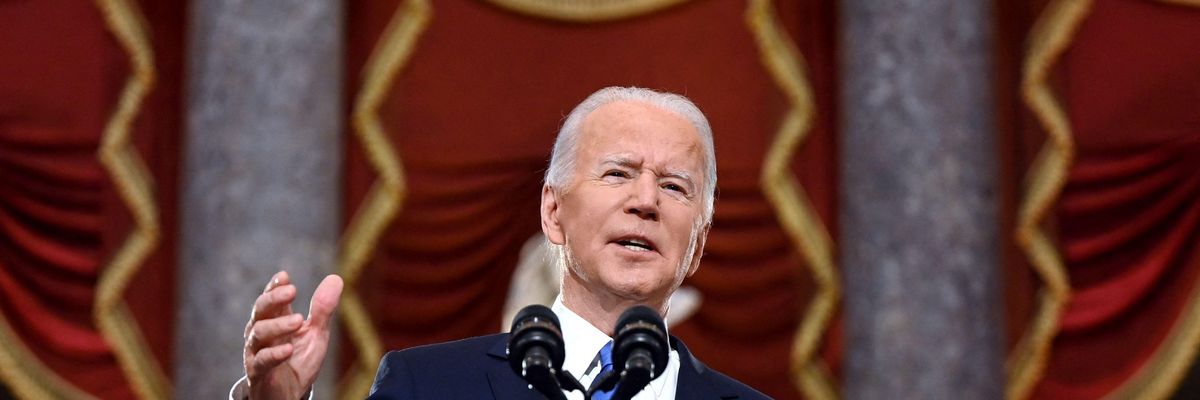One year to the day since then-President Donald Trump and his Republican accomplices' lies about voter fraud led to a failed coup on January 6, 2021, progressives are warning that the GOP's ongoing, nationwide assault on the franchise will continue as long as Senate Democrats fail to pass pro-democracy legislation.
"365 days after the attacks on the 2020 election culminated in the Capitol calamity, we still haven't enacted meaningful reforms to prevent another January 6."
"In America, voters decide the outcome of elections," Lisa Gilbert, executive vice president of Public Citizen, said Thursday in a statement. "Yet 365 days after the attacks on the 2020 election culminated in the Capitol calamity, we still haven't enacted meaningful reforms to prevent another January 6."
"If the Senate doesn't act now," Gilbert added, "we are guaranteeing that there will be more election chaos in 2022."
Jana Morgan, director of the Declaration for American Democracy, a coalition of over 240 organizations leading the fight to pass the Freedom to Vote Act, said that "the January 6 attack last year by right-wing militants who were motivated by former President Trump's Big Lie demonstrated the dangers facing our nation."
"It also underscores the urgency with which we need to transform our political system into one that works for all Americans," said Morgan. "To prevent this kind of attack from happening again, our elected leaders must pass critical legislation that will protect this country from anti-democratic forces."
"The U.S. Senate and President Biden must do whatever is necessary to pass the Freedom to Vote Act, John Lewis Voting Rights Advancement Act, and other critical reforms," she added.
In the twelve months since a reactionary mob stormed the Capitol in a deadly effort to prevent Congress from certifying President Joe Biden's Electoral College victory--after which 147 Republican lawmakers sided with the insurrectionists by declining to verify the results--right-wing officials at the state level have weaponized Trump's Big Lie to enact numerous voter suppression laws and gerrymandered maps, while Senate Minority Leader Mitch McConnell (R-Ky.) has blocked federal voting rights legislation on multiple occasions.
Senate Republicans deployed the filibuster, an anti-democratic rule that requires a 60-vote supermajority to advance most legislation, four times last year to prevent voting rights bills from reaching Biden's desk. After blocking the sweeping, House-passed For the People Act in June and August, they also filibustered its less ambitious successor, the Freedom to Vote Act, in October, and the House-passed John R. Lewis Voting Rights Advancement Act two weeks later.
The Freedom to Vote Act would establish an automatic voter registration system, make Election Day a federal holiday, and ban partisan gerrymandering, while the legislation that bears the name of the deceased civil rights icon John Lewis would restore anti-discrimination protections to the 1965 Voting Rights Act.
"This anniversary calls not only for commemoration, but also for action--urgently."
Senate Democrats--with the support of all 50 members of the caucus plus a tie-breaking vote cast by Vice President Kamala Harris--can reform or nix the filibuster indefinitely, which would enable them to circumvent the increasingly authoritarian GOP's obstructionism and swiftly enact both pro-democracy bills along with the redistributive economic agenda that a majority of U.S. voters elected them to implement.
However, some conservative Democratic senators, including Joe Manchin (W.Va.) and Kyrsten Sinema (Ariz.), remain opposed to abolishing the filibuster and to carving out a voting rights exception to the 60-vote threshold, even as scholars and activists warn that federal legislation is necessary to neutralize the GOP's brazen attacks on the nation's faltering democracy.
"One year ago, an armed mob whipped up by right-wing lies about the election, attacked the Capitol and tried to overturn the results of the election," Brooke Adams, director of movement politics for People's Action, said Thursday in a statement. "Today's anniversary is a reminder of that day and also of right-wing forces' ongoing efforts to rig election rules, pack election boards in small towns across the country, and attack fair voting districts."
Adams said that "corporations and their right-wing, fascist allies want minority rule in this country, and are funding disinformation campaigns alongside their takeover of local election commissions to overthrow democracy."
A recent poll found that one year after the January 6 insurrection, 71% of Republicans continue to believe that Biden's victory was illegitimate. Two months ago, another study found that a growing share of GOP voters--who have downplayed that day's brutality or blamed it on Democrats, Antifa, and the Capitol Police--have endorsed the use of political violence to "save" the country, which is likely why a majority of Americans fear a repeat of last year's attack.
Republican-led state legislatures, meanwhile, have passed dozens of voting restrictions, and according to the Brennan Center for Justice, they intend to escalate their disenfranchisement campaign in 2022.
The laws include limits on the use of mail-in ballots--which Trump, who voted by mail himself, baselessly claimed was a fraudulent tactic ahead of the 2020 election to preemptively delegitimize any unfavorable results--and the criminalization of "ordinary, lawful behavior by election officials" who try to assist voters.
As part of what experts have called an ongoing "election sabotage scheme," pro-Trump lawmakers are also pushing to appoint the former president's loyalists to election boards, voting inspector positions, and other key posts ahead of the 2022 and 2024 elections.
Calling Trump's 2020 election subversion effort "just a warm-up act," a longtime scholar of violent conflict warned earlier this week that in the absence of far-reaching progressive reforms, U.S. democracy "could collapse" by 2025, and "the country could be governed by a right-wing dictatorship" by the end of the decade.
Related Content
Calling Trump 'Just a Warm-Up Act,' Professor Warns of Democratic Collapse in US
Jake Johnson
"We know that what happened one year ago was made possible by decades of disinvestment thanks to neoliberal policies," said Adams. With the GOP "building towards a midterm bloodbath and another attempted presidential coup," she added, "our future depends on... organizing everyday people around a progressive agenda that hits at kitchen table issues and to electing the people who will win that agenda for us at every level of government."
Like Adams, Rep. Pramila Jayapal (D-Wash.), chair of the Congressional Progressive Caucus (CPC), acknowledged that "the events that led to the insurrection began long before former President Trump encouraged rioters to march on the Capitol."
"January 6 was the most visible day of violence," said Jayapal, but "for years, Republicans in state legislatures, courts, and Congress have engaged in a more covert attack, chipping away at free and fair elections and taking direct aim at Americans' constitutional rights and our democracy."
Jayapal's statement continued:
Since the Supreme Court gutted the Voting Rights Act in 2013, state legislatures have enacted hundreds of laws designed to reduce the political power of communities of color, young people, the elderly, [and] people with disabilities. The racist voter suppression that the justices claimed was a relic of the past came roaring back with a vengeance, such that 2021 became the worst year for restrictive state voting laws in a decade; legislatures filed more than 440 bills and enacted laws in 19 states.
At the same time, the Republican party pushed incendiary lies about voter fraud and Democrats stealing elections from the highest levels. It was on this tidal wave of anti-democratic activity and rhetoric that the January 6 rioters descended on Washington and attacked the Capitol. And the attack has continued since, with partisan actors driving unfounded election audits, violent threats on election officials, and the passage of laws explicitly allowing partisan interference with election results, in direct backlash to the 2020 election.
"That is why this anniversary calls not only for commemoration, but also for action--urgently," added the lawmaker, who is among a list of participants expected to speak during a gathering on the National Mall scheduled to begin at 4:45 pm ET. "If Congress fails to pass legislation to secure the right to vote and protect Americans' democratic freedoms, we invite these attacks to continue."
"To prevent this kind of attack from happening again, our elected leaders must pass critical legislation that will protect this country from anti-democratic forces."
Ben Jealous, president of People For the American Way, noted that one year after "we watched in shock and terror as violent extremists attempted to overthrow our democracy... we gather to mourn the lives lost on the day of the insurrection and in its aftermath, and to remind President Biden and the Senate that there is still much work to be done to safeguard our democracy," referring to more than 350 events, including vigils and voter registration drives, planned across the country.
"For America to move forward," Jealous continued, "we must hold all of those who perpetrated the crimes of that day responsible for their actions--including those who colluded with insurrectionists to allow entry into the Capitol and those who worked within the Trump administration who remain unwilling to cooperate in investigations."
Just hours after last year's right-wing insurrection, Rep. Cori Bush (D-Mo.) announced House Resolution 25, which is supported by 54 other Democrats and calls for the House Committee on Ethics to "investigate, and issue a report on, whether any and all actions taken by members of the 117th Congress who sought to overturn the 2020 presidential election violated their oath of office to uphold the Constitution," or the chamber's rules.
Last week, Bush said that lawmakers should comemorate the January 6 riot by passing her resolution to "expel the members of Congress who helped incite the violent insurrection at our Capitol."
Meanwhile, as the House Select Subcommittee on the January 6 attack continues to scrutinize that day's events, including potential crimes committed in the lead-up to it, Attorney General Merrick Garland on Wednesday vowed to prosecute perpetrators "at any level."
In addition to pursuing accountability, Jealous added, "we must also move swiftly to pass the Freedom to Vote Act and other federal voting rights legislation to stop voter suppression bills in states across the country fueled and maintained by the same Big Lie that led to the insurrection and intended to disenfranchise millions of Americans."
Calling the Freedom to Vote Act and the John Lewis Voting Rights Advancement Act "the best chance to fundamentally strengthen and protect our democracy," Ramon Cruz, president of the Sierra Club, lamented that "both bills are currently stalled in the Senate by the Republican minority."
"The American people are demanding action to protect voting rights, tackle the climate crisis, and safeguard our communities," said Cruz, "and by passing these two bills, our country will be closer than ever before in achieving those goals."
Jayapal, for her part, stressed that "we cannot allow Republicans' lies or arcane Senate rules to stand in the way of Congress upholding its most basic constitutional responsibilities."
Applauding Senate Majority Leader Chuck Schumer (D-N.Y.) for announcing a January 17 deadline for Democrats to "debate and consider changes to" the filibuster, Jayapal said that the CPC is "committed to doing whatever it takes to ensure he succeeds... in pushing voting rights restoration forward in the upper chamber."
"The most basic promise of American democracy is that every person's voice must be heard and vote counted," said Jayapal. "We cannot fail."






